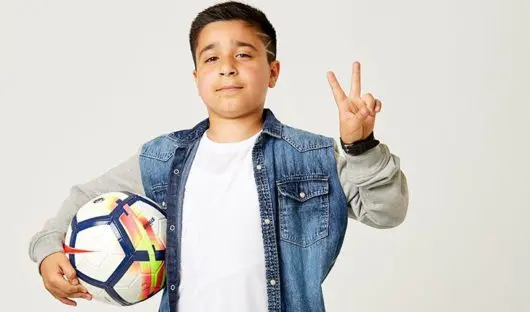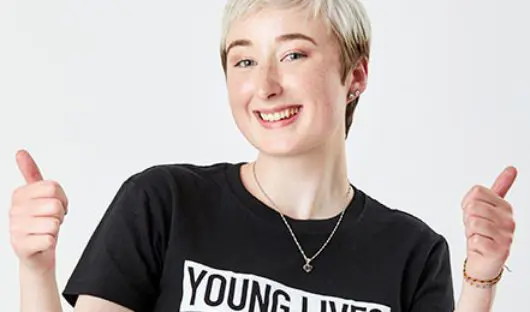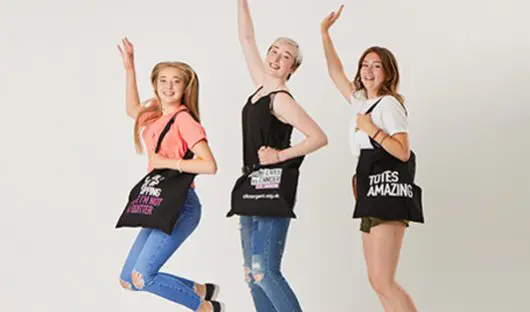My friend has cancer
So you’ve heard the news. Your friend has cancer and it’s like, WTF? How did that even happen? Cancer will undoubtedly have a big impact on their life - and possibly yours. So what can you do to help? Laura, our Young People's Community Worker, has developed some tips and advice.
It’s rare for teenagers and young adults to get cancer. Any experience you’ve had with cancer has probably been an older person. But this is different – this is your friend.
Cancer is overwhelming. Your friend will have different challenges to deal with but no one expects you to suddenly turn into a counsellor – including your friend! That’s not your job. Just be a good mate, be there and be yourself. We’ve got some tips and information below to help you with that.
Where will they be treated?
Your friend might be treated in their local hospital or they might travel to a specialist treatment centre for young people. They might be able to carry on with normal life at home, or they might have to stay in hospital for a long time. It all depends on their personal plan of action. Hospital can be isolating and lonely, so one thing you can do to help is make sure you stay in regular contact.
How will they feel on treatment?
Treatment can be gruelling physically and emotionally. So your friend’s likely to feel pretty rubbish. Side effects can include feeling sick and super tired. Steroids can make people put on weight and chemo causes hair loss. It’s important not to look at them or treat them any differently as they are the same friend behind all these side effects.
How will they feel after treatment?
Finishing treatment isn’t always a time for celebration and partying. No doubt it’s an important and positive milestone. But “getting back to normal” is easier said than done. Cancer might have forced your friend to change their plans. They might have missed college, quit working or moved back home. There’ll be a lot of practical stuff to sort out to get their life back on track, and maybe they could use some help?
Emotionally, it’ll be a weird time. Hospitals bring a comfort and a caring network of people, that they might miss. They’ll feel pressure to not keep talking about their cancer, and might think no one understands how they feel. There’s also the fear of the cancer coming back, and anxiety about the future. On top of that, there’s the physical effects, like fatigue or fertility issues from treatment. Now is the time that they’re going to need you.
HannahThose who supported me the best were those that remembered that even though I had been diagnosed with cancer, I was still me. They weren’t scared to talk to me, to ask questions, but, most importantly, be normal with me. They sent messages without expectation of a response, came round to see me, took seriously the need to make sure they weren’t unwell when, complimented my bald head, made me smile, and they loved me throughout.
How can I help my friend?
If your friend is stuck in hospital, they might feel everyone’s lives are moving forward while they are standing still. Show them that you haven’t forgotten about them. Don’t forget to include them and keep the invites coming even if you think they won’t be able to make it. They will appreciate you thinking of them and it won’t be long till they’re able to socialise again.
Make regular visits if you can, or arrange something if they can get out and about. On some types of chemotherapy they might even know when they will be expected to have a ‘good week’ (aka won’t feel sick, won’t be neutropenic, etc) – make sure you try to plan something for when they’re feeling well! If you’re too far away, message often and keep checking in. It doesn’t have to be weird – talk about whatever you usually do!
Don’t rely too heavily on social media. Your friend might use it to keep up to date with the ‘outside world’ but it has the potential to make them feel even worse. They have to witness everyone getting on with their ‘normal’ lives. So, don’t assume they are updated. Instead, send them a little video message to let them know you miss them.
Treatment can be rough physically and emotionally so the little things help. Check if there’s any tasks you can take on. Your friend’s parents might have this covered but if their family aren’t in the picture, it can make a massive difference.
Can you pick up anything they need from the shops while they’re in hospital? If they have their own kids, can you do a school run or babysit? Maybe it’s more about acting as a point of communication so your friend isn’t having to repeat themselves again and again.
On the emotional front, you shouldn’t feel pressure to be something that you’re not. Just make time for them, listen to them and be there for them. They might feel they need to be strong for other people, so make it ok for them to share everything with you. But make sure you get support for yourself too.
While it’s not compulsory or even expected to buy your friend a gift you may find you want to send them something so they know they’re being thought of. Here are some suggestions for gifts which other young people have found helpful:
- Fairy or novelty lights – hospital rooms can be really dull and boring. Lights will help make the place feel a bit more homely with some softer light.
- Nausea– some cancer treatments can make you feel a bit nauseous so ginger biscuits and/or tea or anti-sickness bands can sometimes help combat sicky feelings.
- Lip balm or a nice moisturiser- chemotherapy and radiotherapy can leave your skin very dry so a fragrance free lip balm or moisturiser would be good for hospital.
- Sleep – hospitals can be loud and bright! An eye/sleep mask and earplugs can help with a restful night’s sleep or a daytime nap.
- A 365 jar – come up with 365 (or 10/20/30- whatever jar!) memories; jokes, song lyrics, funny moments, or whatever would make your friend smile. If you have a group of friends you could all contribute to make it easier. Click here for a tutorial.
- Care package – this doesn’t have to be something expensive just a box with their favourite treats or items. The touch is that it is personalised to them so it will make them smile and know they are being thought of.
- Food – sometimes treatment can affect your taste buds. You may find your friend doesn’t have much of an appetite or will have gone off foods they used to love. Ryan Riley’s Life Kitchen cookbook is a good buy for any foodie on treatment. Or if they find everything tastes metallic using plastic cutlery can help.
- Heat – treatment can make you feel colder than normal so hand warmers and fluffy socks can help make your friend feel a bit warmer
You may find that some things are best to avoid for your friend such as;
- Colouring books – they are a bit of a trend at the moment so you might find your friend will have lots of them already…though if they really love colouring this could be a good present.
- Perfumed products – smelly bath bombs and lotions may be a winner normally but during treatment they could irritate sensitive skin.
- Events – non-refundable or non-changeable tickets for an event. It’s hard to future plan when your friend has cancer because they may be having treatment, surgery or be feeling too unwell to attend. If the tickets are changeable or you can easily get a refund it might be a good idea – but make this clear to your friend so they know that there is no pressure to attend so they don’t feel guilty.
Finishing treatment might mean that your friend loses the structure, routine and support that they’ve gotten used to since their diagnosis. Suddenly having to figure things out without this safety net is a massive deal, and you shouldn’t underestimate how difficult this could be for them.
Having to suddenly pick up the threads of their old life can be really hard, especially if cancer has changed their perspective on things or made it difficult to continue down a certain path.
The best thing you can do is to try and understand what they’re going through. Understand that they might be feeling fearful about the future, or alone, or guilty. Focus on listening, give them opportunities to talk. This video from SpunOut brilliantly gives tips on how to actively listen and keep a conversation going during difficult moments. Don’t rush them into getting back to normal. Things might not get back to the way they were before, but that’s ok.
LucieThe friends who never give up on us even when we decline - invite after invite to go out or to see them. The friends who understand we don't always feel up to going out. So instead they don't give up like many others do, they persevere and make sure we aren't forgotten about, they come to us when we can't come to them!
Read more about what your friend is dealing with
Understanding what your friend’s up against can really make a difference. Browse our info for young people with cancer by topic to familiarise yourself with some of the issues they might be up against.
Support yourself
Being there for your friend doesn’t mean that you’re not going to feel down at times too. Watching someone you care about go through cancer can be scary and tough. Supporting your friend means pressure on your shoulders while you also have to deal with your own emotions.
It’s normal to feel sad or low – and you shouldn’t feel guilty or selfish. It’s also important that you have someone who will listen to how you’re feeling too. So talk to another friend, your family, doctor or a counsellor. The Ring Theory is a brilliant thing to keep in mind when you’re venting to consider who and where it is appropriate to share your upset or frustrations.
Say “I’m Here for You”
When your friend is diagnosed with cancer, you can often feel completely helpless. That’s why we’ve developed Here for You – our fundraising platform for friends, family, colleagues and classmates.
Showing you care will look different to everyone, so we’re here to help you find what works for you. Whether you take on a challenge, make a donation or come up with something totally unique, your support will help children and young people with cancer, and their families, get the right care and support at the right time.
Find out more

